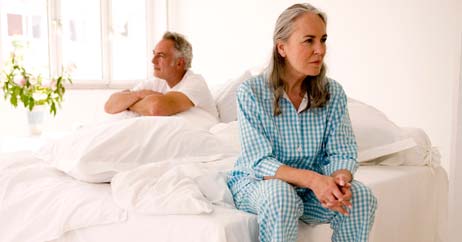



- Viagra
- Sildenafil Citrate (TP)
- Sildenafil Citrate TEVA
- Tadalafil TEVA
- Tadalafil ACCORD
- Tadalafil DAILY
- Vardenafil TEVA
- Vardenafil ZYDUS
- Sildenafil Citrate (GS)
- Cialis
|
Painful Sex After Menopause? When Hormones Aren??™t an Option, Some Women Consider Surgery
2011-12-27
|
Painful Sex After Menopause? When Hormones Aren’t an Option, Some Women Consider Surgery

THURSDAY, October 6, 2011 (Health.com) — Linda Bianchini was in her mid-50s when sex with her husband became unbearably painful.
“Before I started to have discomfort, our sex life was good. I had only remarried in 2004 so, although we were middle-aged, we were still like newlyweds,” recalls Bianchini, now 57, a human resources manager at a hospital in Staten Island, N.Y. “It had been going on for at least a year, but I just did not bring it to my doctor since I thought it is just the way it is.”
But sex became so infrequent that, desperately, Bianchini finally mentioned the problem to her gynecologist, David Herzog, MD. Herzog explained that after menopause, decreased estrogen levels in the body can lead to loss of elasticity, or atrophy, around the vaginal muscles—essentially shrinking the opening and making it more difficult to have intercourse.
It’s not an uncommon problem: Dryness and pain during intercourse are two of the main causes of female sexual dysfunction, which affects more than 40% of women and is most common between ages 45 and 64, according to the 1999 U.S. National Health and Social Life Survey. (Other causes include lack of interest and inability to experience orgasm.) A 2007 study found that among women ages 57 to 64, 34% avoid sex altogether, citing pain (18%), decreased lubrication (36%), and low desire (44%) as their reasons.
Hormone replacement therapy is an option for many women who experience vaginal atrophy or dryness, but Bianchini was concerned about the increased breast-cancer risk that comes along with taking hormones. (The absolute risk is very small, but Bianchini had been diagnosed with cystic breasts—a condition that can make cancerous tumors harder to detect—and didn’t want to take any chances.)
She was a candidate, however, for a new procedure Dr. Herzog had developed, called Laser Augmentation of the Vaginal Area (LAVA), designed to loosen and reshape the outer layer of the vaginal opening to allow for easier penetration during sex. After learning more about it and talking it over with her husband, Bianchini went through with the surgery—a move she says has given her back her sex life, her confidence, and her romantic bond with her husband.
Dr. Herzog’s LAVA procedure, which is currently only conducted by a few trained physicians in New York, California, and Canada, may seem counterintuitive: Many people believe that the vaginal opening gets bigger as a woman ages, especially after childbirth. But muscle atrophy due to lack of hormones actually creates the opposite effect, Dr. Herzog says, especially in women who have never had children or who have given birth only via Caesarian section.
For older women, dryness and lack of elasticity—sometimes combined with their partners using erection-boosting drugs like Viagra—can make penetration or sustained sex difficult, and may result in tearing or scarring of the vaginal tissue. (Younger women whose partners’ penises are too large for their vaginas may also be candidates for his procedure, he adds.)
Next page: Few women are LAVA candidates





